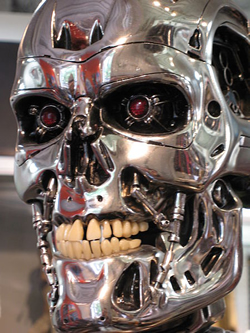Communication has already changed dramatically in my lifetime. I grew up with rabbit ears and snail mail. Now I have a satellite dish and text messaging. The future will bring a slew of new products that will change the way we communicate with each other and with machines.
 Recent advancements in 3D imaging and scanning technologies are making your "virtual presence" a real possibility.
Recent advancements in 3D imaging and scanning technologies are making your "virtual presence" a real possibility.
Current methods of high speed scanning make it possible to get a 3D scan of your face in a fraction of a second. In the future, projecting yourself or a room full a people to another location may be commonplace.
Methods of reassembling your virtual 3D self might take the form of 3D holographic displays or shape-shifting nano-bots.
Electronic Paper
Today, the portable wireless devices that allow you to download and read a newspaper or book, sometimes called eReaders, are convenient and can also help reduce the amount of paper we use. eReaders of the future will be paper thin, flexible and have wireless connections. When not being used, large displays may roll-up or neatly fold away.

Hollywood's Favorite Villain
For many people, their first glimpse of a new technology might come from entertainment media. Science and technology are often portrayed as villains in science fiction because, well let's face it, any other way would be boring. What are some of the effects on society when technology is depicted negatively in the media?
Positive effect: A movie-goer may have heard of nanotechnology and not really understood, or cared to understand, how it could be used. After watching a scientist on the big screen inject himself with "nanobots" and become superhuman, they may leave the theatre thinking, "Can those nano things really do that?".
Positive effect: Some areas of science and technology do pose a risk to society, with scenarios even the best scientific minds cannot predict. When science fiction writers research a technology and then use their imagination to create a great story, (however improbable), it can raise public awareness to real issues that may lie ahead.
Negative effect: People may disapprove or fear a technology based on unrealistic scenarios seen in the media.
Positive effect: Disregard the token mad scientist lurking in almost every techno-thriller and the media may also be good for the scientific community. As unlikely as any sci-fi plot may be, it is sure to be a hot topic among those that study the science behind the story. This could bring new minds together and invoke discussion on valid scientific and ethical questions.
In general, I feel society benefits from any media exposure that new technologies receive, because it gets people thinking and talking. Today's public is media and tech savvy. Most of the people I know can recognize the difference between a good story and a patent application.
No comments:
Post a Comment